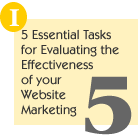

5 Steps to Success
What it Takes to Create a Successful Web Site
1.) Content
There is no substitute for good, relevant content!
Stay focused and build out on the main theme of your web site.
Keep in mind that "search engine friendly" content focuses individual pages on specific topics/keywords.
The design of your site is important. It needs to be aesthetically pleasing, with navigation that is easy to understand. UI (User Interface) testing is critical. Use focus groups, friends, even co-workers to make sure people understand the point of your site, and how to find what they are looking for.
3.) SEO
Search Engine Optimization...
SEO relates to a number of things, including the programming code, keywords/phrases, placement of content on the page, topic focus, meta tags, header tags, and more. Most search engines acquire their listings by sending out a "spider" (also known as a "robot") which "crawls" the pages of your web site, following any links it finds, and "indexing" the results.
Because it is just an automatic program, it cannot actually "see" your web site.
Instead it relies on interpreting the code and text it comes across as it works it's way through your pages.
How you have structured this code, and the text your pages contain can seriously effect how your site is "ranked" in the search results for a given search term or phrase.
Search Engine Marketing comes into play after you have done the first three steps.
This is where you submit your site to search engines and directories, research niche places (sites, search engines, directories, wiki's, etc.) to list your site on, and pursue myriad other opportunities to promote your web site. It is also where you develop a link building strategy. It is vitally important to have a network of relevant sites linking to you. A solid network of links accomplishes two things, it helps your rankings, and it brings in its own qualified traffic.
5.) Conversion
What good are visitors to your web site if they aren't doing what you want them to?
This is where you need to develop landing pages with clear action items.
Your visitors need to immediately get what they can do here, and take the action you want them to.
This requires careful design and much testing. You need to constantly monitor results, analyze your metrics, try new approaches, and roll out the winners. Develop, Test, Rinse & Repeat.

